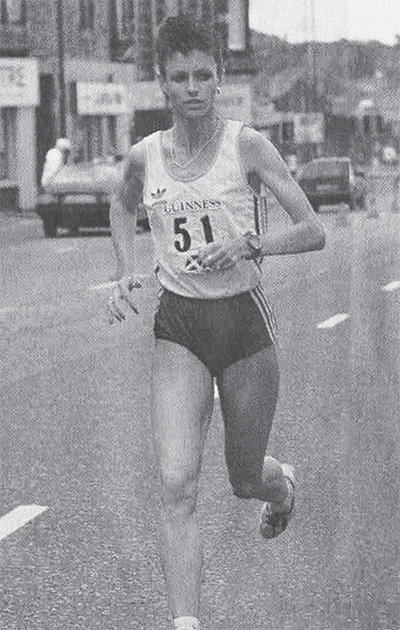
Lisa was born in Gawler, South Australia and began athletics as a sprint hurdler. She was a champion schoolgirl athlete and competed for Enfield Harriers in Adelaide.
Unfortunately she lacked speed and moved up to 400 metres hurdles in 1978 and set South Australian junior and senior records and finished eighth in the National Under 18 Championships in Brisbane.
In the 1979 Nationals in Perth Lisa finished fifth in the event in 60.73 secs. The following year she was eighth in the Nationals in Sydney and with a much slower time of 64.05 secs. It was time to look elsewhere.
In 1980 she obtained a scholarship to the University of Oregon in the USA where she left the hurdles behind and moved onto longer distances. She competed successfully on the US College circuit and in 1981 ran a personal best over 3,000 metres of 9.22.4 in Berkeley. Two years later in Eugene she reduced this time to 9.14.88 and then set Australian records for 5,000 metres of 16.06.15 in Houston and 10,000 metres of 33.12.1 in Berkeley.
In December that year Lisa ran her first marathon in Huntsville, USA in 2 hours 32.21 which was an Australian best.
By this stage she had married US steeplechaser Ken Martin and was running under her married name. She was looking for a spot on the Australian Olympic team for Los Angeles in 1984.
Lisa returned home for the Nationals and Olympic Trials in Melbourne and finished second in the 3,000 metres behind fellow South Australian Donna Gould in a time of 9.15.60.
The 1984 Olympics was an important occasion in athletics with the women’s marathon contested for the first time. The day was fairly warm and Joan Benoit of the USA led from start to finish to win comfortably. Lisa was impressive in her Games debut – a little over four minutes behind in a new personal best of 2hrs 29.03 in seventh place. In October she ran faster still, finishing second in the Chicago marathon in 2hrs 27.40 behind Portugal’s Rosa Mota.
In 1985 Lisa with husband Ken ran the Pittsburgh marathon – both winning their division and became the fastest married couple in history. Lisa’s time was 2hrs 31.54.
The 1986 Commonwealth Games in Edinburgh, Scotland was beset by boycotts but it also saw the first women’s marathon at a Commonwealth Games. Lisa ran a strong race winning by over two minutes from New Zealand’s Lorraine Moller in 2hrs 26.07. In November Lisa backed up in the New York marathon, taking second in 2 hrs 29.12.
Lisa started 1987 well with another fine second, this time in Osaka, Japan in January behind Moller in 2hrs 30.29. She ran the 1987 World Championships in Rome but was not well and did not finish.
She returned to Osaka in 1988 and ran the fastest time of her career winning in 2hrs 23.51 – an Australian best. Her time also set a course record which stood for 11 years.
At the 1988 Seoul Olympics Lisa stayed with the lead group until Rosa Mota made a break 4km from home. She tried but could not bridge the gap and finished just 13 seconds adrift in in 2hrs 25.53 – a silver medal of the highest quality.
She defended her Commonwealth title in Auckland in 1990, leading from start to finish and winning in 2hrs 25.28 by nearly eight minutes from team mate Tani Ruckle. It was an astonishing solo performance.
By now Lisa had divorced Ken Martin who had also coached her and married Kenyan Yobes Ondieki in 1990 who in turn also took over her coaching. Later that year she gave birth to a daughter Emma.
She again tried to win the New York marathon in 1991, coming third behind Britain’s Liz McColgan and Olga Markova from the USSR in 2hrs 29.01.
Olympic year 1992 started well with a personal best half marathon of 1hr 08.33 in Tokyo, an Australian best and then perhaps surprisingly to many returning to the track for an Australian 10,000m record in Helsinki, Finland of 31.11.72.
The Olympics were held in Barcelona, Spain and Lisa started as one of the favourites, however the heat took its toll and she failed to finish. Later that year she achieved one of her ambitions – finally winning the New York marathon in a course record of 2hrs 25.28 which lasted for 9 years. This was, according to Lisa in an interview, her best marathon.
In 1993 she finished second in the London marathon behind Germany’s Katrin Dörre in 2hrs 27.27 and the following year was third in Tokyo in 2hrs 31.01. Two weeks later she won the Zatopek 10,000 metres in Melbourne in 31.47.11. She had previously won it in 1987.
By this time Lisa had parted from Yobes and had returned to the coach who took her to Olympic success – Dick Telford.
Another Olympic year came along in 1996 and began with a ninth place for Lisa in the Osaka marathon in 2hrs 30.27. However the Atlanta Olympics did not go to plan and she failed to finish.
The Olympic silver and dual Commonwealth gold medallist’s outstanding career had concluded – leaving a great legacy as one of her country’s greatest female distance runners, representing it in nine major competitions, and being its national champion on three occasions. She was recognised with induction into the Sport Australia Hall of Fame in 1997 and in 2000 with the Australia Sports Medal.
Paul Jenes OAM
Athletics Australia Statistician
Acknowledgements: Peter Matthews: editor The International Track and Field Annual. Years 1980 to 1997; Mark Butler: IAAF Statistics Book Moscow 2013; Harry Gordon, Australia and the Olympic Games; Paul Jenes, Fields of Green Lanes of Gold; Paul Jenes & Peter Hamilton, Australian Athletic Results; Bob Phillips, Honour of Empire Glory of Sport; Coolrunning; Wikipedia; Sport Australia Hall of Fame, Brian Roe

